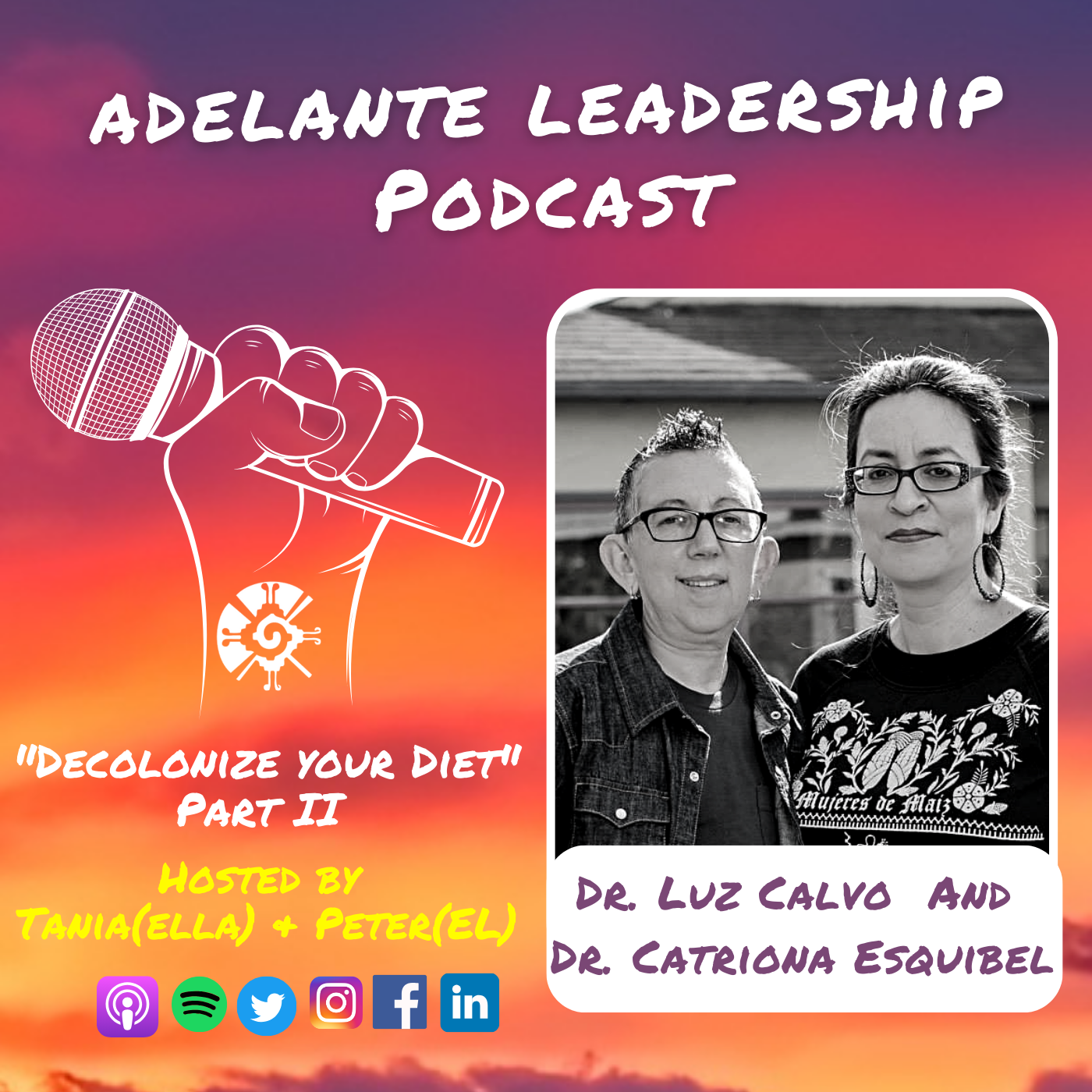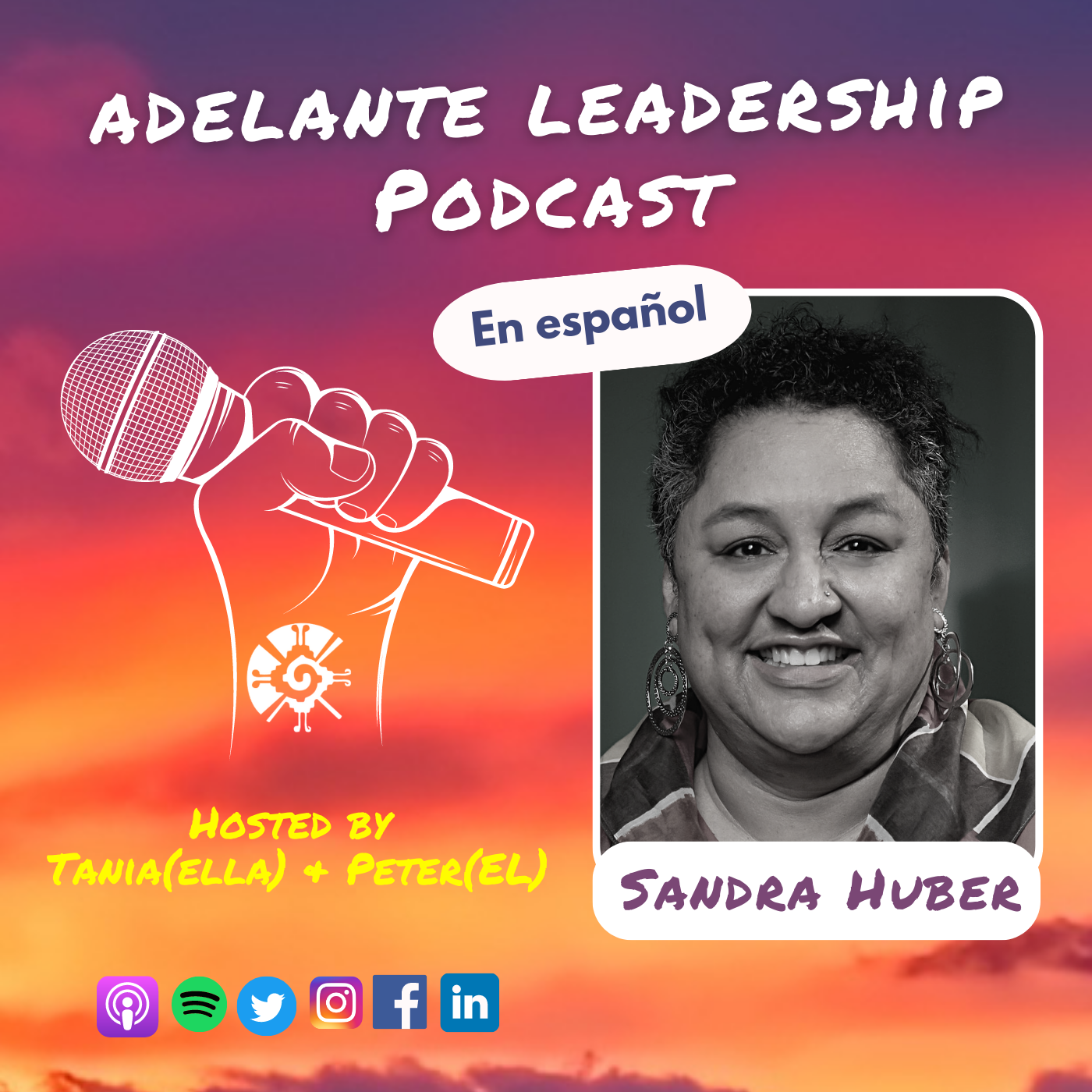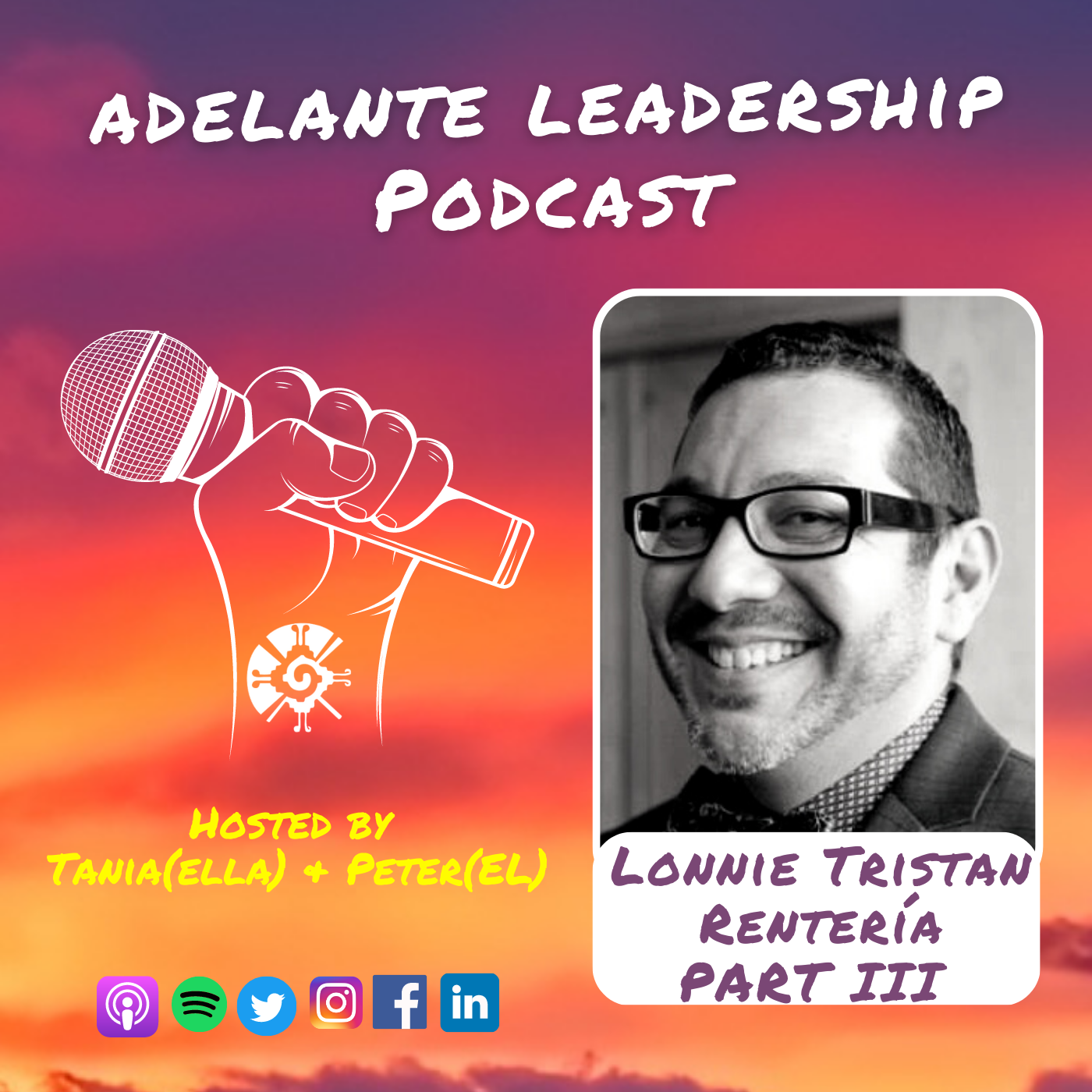Season 2- Episode 32: Reflections with Veronica Duran- Sisk.
Tania and Peter reflect episode 27 through 31.
Veronica Duran-Sisk was born in Quito, Ecuador and obtained her International Business and Master’s degree in marketing.
After one year of arriving to the USA, she landed a job at the Oregon Health and Science University (OHSU) as a Spanish Interpreter. This work gave her the opportunity to meet many people from different backgrounds and cultures. Through this experience, she learned that Spanish-speaking people not only sought help with the language, but also sought to share their lives with someone who had something in common.
When she moved to Seattle, she had the opportunity to attend the Latina Symposium at NSC. She later become a volunteer in the Latina Symposium, 8 years later she is now the president of Somos Mujeres Latinas. www.smlwa.org
Veronica states "I joined the Symposium team as a collaborator, and today I am the president of SML. I feel so lucky to get to work with this group of women who have changed my life and inspired me to learn more".
Season 2- Episode 31: Victoria Santos - The Power of Latine Leadership.
Tania and Peter talk to Victoria about the power of Latinx leadership
Victoria Santos is a Spanish-fluent Afro-Caribbean who was born in a rural village in the Dominican Republic. Her work is rooted in a vision of human potential to advance social justice and racial equity. From over thirty years of lived experiences, she shares her knowledge and wisdom in all her work with a deep commitment to our collective liberation. She is the founder and director of Commonweal’s Center for Healing and Liberation and co-Executived Director of the BIPOC Executive Director Coalition.
Season 2- Episode 30: Dr. Luz Calvo & Dr. Catriona Esquibel: Decolonizing your diet - Part II.
Our recipes highlight the immense diversity of healthy, native foods in dishes that are accessible yet satisfying. Reclaiming our vitality as a people means embracing a plant-based diet of whole foods. In our view, people can eat responsibly whether they are vegans, vegetarians, flexitarians, pescetarians, or omnivores. In a decolonial framework, there is room for multiple ways of eating, so we don’t believe everyone needs to make the same food choices. While we are committed to reclaiming knowledge about our ancestral foods, we are not calling for a rejection of any food not native to the Americas, nor do we desire to recreate any one diet from a previous era. We understand that all cultures are living and evolving. Decolonize Your Diet does not tout certain so-called “super foods”; instead, it is a whole food system of eating. Our abuelitas (grandmothers) prepared a simple diet that was as flavorful as it was nourishing.
The staples of their diets were beans and tortillas, supplemented with many fruits and vegetables: avocado, corn, tomatoes, chiles, wild greens, squash, herbs, berries, pineapples, papayas, and more. We invite readers from diverse backgrounds to take up our call to bring playfulness and creativity to cooking, to search for healthy alternatives in more than one direction, to resist the acculturation that tells us white bread is food, and to share this message with your communities: La comida es medicina, food is medicine. More than just a cookbook, Decolonize Your Diet redefines what is meant by “traditional” Mexican food by reaching back through hundreds of years of history to reclaim heritage crops as a source of protection from modern diseases.
Season 2- Episode 29: Dr. Luz Calvo & Dr. Catriona Esquibel: Decolonizing your diet - Part I.
Our recipes highlight the immense diversity of healthy, native foods in dishes that are accessible yet satisfying. Reclaiming our vitality as a people means embracing a plant-based diet of whole foods. In our view, people can eat responsibly whether they are vegans, vegetarians, flexitarians, pescetarians, or omnivores. In a decolonial framework, there is room for multiple ways of eating, so we don’t believe everyone needs to make the same food choices. While we are committed to reclaiming knowledge about our ancestral foods, we are not calling for a rejection of any food not native to the Americas, nor do we desire to recreate any one diet from a previous era. We understand that all cultures are living and evolving. Decolonize Your Diet does not tout certain so-called “super foods”; instead, it is a whole food system of eating. Our abuelitas (grandmothers) prepared a simple diet that was as flavorful as it was nourishing.
The staples of their diets were beans and tortillas, supplemented with many fruits and vegetables: avocado, corn, tomatoes, chiles, wild greens, squash, herbs, berries, pineapples, papayas, and more. We invite readers from diverse backgrounds to take up our call to bring playfulness and creativity to cooking, to search for healthy alternatives in more than one direction, to resist the acculturation that tells us white bread is food, and to share this message with your communities: La comida es medicina, food is medicine. More than just a cookbook, Decolonize Your Diet redefines what is meant by “traditional” Mexican food by reaching back through hundreds of years of history to reclaim heritage crops as a source of protection from modern diseases.
Season 2- Episode 28: Gloria Santiago - Tu cultura es tu medicina.
Peter y Tania hablan con Gloria Santiago de usar nuestra cultura como la medicina para descolonizar.
Gloria es una reconocida activista y defensora de los derechos de las mujeres y las comunidades latinas.
En esta entrevista compartirá su experiencia y conocimientos en la lucha por la equidad y la justicia, y cómo podemos unirnos para crear un cambio positivo en nuestras comunidades.
Season 2- Episode 27: Sandra Huber - Salud mental y el trauma del inmigrante.
Pete y Tania hablan con Sandra Huber sobre la salud mental y el trauma del imigrante
Sandra trabaja para profundizar las relaciones con agencias comunitarias, escuelas, organizaciones de atención médica y agencias gubernamentales mientras genera confianza, transparencia y un compromiso significativo con nuestros residentes. A través de eventos y conversaciones, identifica problemas emergentes que enfrentan nuestras diversas comunidades y ofrece clases y otras oportunidades para apoyar esas necesidades.
Season 2- Episode 26: Reflections with Lupita Torrez.
Peter and Tania reflect with Lupita on episodes 21 through 25.
Lupita Torres is a seasoned community organizer and leader. She is the founder of two nonprofit organizations in the Seattle-King County Metro region focused on developing Latine community leadership and advocacy for system change and advancing racial equity. She currently empowers students at Seattle University as an Early Learning Manager. When she was little, she wanted to grow up and be a bank teller to have a lot of money and buy shoes for birds.
Season 2- Episode 25: Dr. Lonnie Rentería - Part III Trauma Healing
Peter and Tania talk to Lonnie about heal trauma strategies.
Lonnie Renteria enjoys caring for patients of all walks of life, as well as building relationships with them. His goal is to help patients live healthy and fulfilling lives. His interests in psychotherapy include working with BIPOC and LGBTQ communities.
When away from his clinic, Lonnie is busy volunteering with agencies serving immigrant families, reading, binging television shows, or listening to his vinyl collection. He is fluent in English, French, and Spanish and has lived in France, Canada, and Mexico.
He is a lover of art and does what he can to surround himself with beauty. He has a passion for wholistic health and will often talk about yoga. He enjoys cooking and experimenting with making dishes that have international origins.
Season 2- Episode 24: Dr. Frederick Luis Aldama and Arturo J. Aldama. "Decolonizing Latinx Masculinities.”
Dr. Frederick Luis Aldama is known for this work as the Jacob & Frances Sanger Mossiker Chair in the Humanities, founder and director of the Latinx Pop Lab, and Affiliate Faculty in Radio-TV-Film at the University of Texas, Austin, and Adjunct Professor & Distinguished University Professor at The Ohio State University.[3
Dr. Arturo J. Aldama is an associate professor and chair of Ethnic Studies at the University of Colorado, Boulder, and affiliate faculty in Gender and Women’s Studies.
And, together they are co-editors of the book Decolonizing Latinx Masculinities where they explore how legacies of colonization and capitalist exploitation and oppression have created toxic forms of masculinity that continue to suffocate our existence as Latinxs. The book intends to decolonize masculinities today to grow a stronger, resilient, and more compassionate new generation of Latinxs.
Season 2- Episode 23: Ramona Beltrán. "Our stories are our medicine.”
Ramona Beltrán, MSW, PhD is a mixed-race Xicana of Yaqui and Mexica descent and dancer/activist/scholar. As an Associate Professor at the University of Denver Graduate School of Social Work, her scholarship focuses on interrupting legacies of historical trauma that affect Indigenous and Latinx communities with a commitment to addressing issues facing women, youth, LGBTQ and Two Spirit communities. She is particularly interested in disrupting the problem-focused approach to understanding Indigenous and Latinx health and well-being that is common in mainstream research. She does this by centering cultural protective factors, strengths and resiliencies, art, and storytelling in investigating and collaborating with Indigenous and Latinx communities.
Season 2- Episode 22: Milvia Pacheco. "Expresando el conocimiento través de la danza y el arte".”
Milvia Pacheco is an Afro-Latina artist born in Caracas-Venezuela, where she began her career as a dancer combining dance and theater training. Experiences with trauma at an early age fueled in her a pressing drive toward movement. She went on to devote her life to reaching liberation through art and movement. In this Journey, She become a contemporary dancer, choreographer, performer, bodyworker, visual artist, mother and Community Organizer. MÁS (Movimiento Afrolatino Seattle) has become the platform where she continue serving as a conduit for empowerment and beyond empowerment for herself and others.
Season 2- Episode 21: Dr. Gloria Bonilla-Santiago. “Breaking ground and Barries”.
Dr. Bonilla-Santiago shares about her book Breaking ground and barriers- Hispanic Women Developing Effective Leadership and her new book The Miracle in Cooper Street.
She is a Board of Governors Distinguished Service Professor at the Department of Public Policy and Administration and Director of the Center for Strategic Urban Community Leadership at Rutgers University-Camden.
Season 2- Episode 20: Reflexions with Dr. Ileana Ponce-Gonzalez
Tania Hino & Peter Bloch Garcia reflect with Dr. Ileana Ponce-Gonzalez on Episode 19, 18, 17 and 16.
Ileana Maria Ponce-Gonzalez, MD, MPH, Founder and Executive Director at Community Health Worker Coalition for Migrants and Refugees (@CHWCMR)
Season 2- Episode 19: Dr. Oriel Maria Siu. “Decolonizing early childhood education”.
Oriel María Siu is a Náhuatl/Pipil/Chinese writer, scholar, and educator from Honduras. She is the writer of the children’s book series, Rebeldita the Fearless / Rebeldita la Alegre. In 2020, Dr. Siu was selected "Top Ten New Latinx Authors" by Latino Stories for her contributions to children's literature. In this series, Dr. Siu centralizes the power of children and challenges the colonizer Narrative from an Indigenous Perspective. Throughout her journey as an educator, Dr. Siu has been a strong proponent of Ethnic Studies, contributing her research, writing and teaching to sustaining and expanding this transformative, needed, academic field.
Season 2- Episode 18: Mónica Rojas- Stewart. “Sanar el trauma a traves del arte y la música”
Tania y Peter hablan con Monica sobre sanar el trauma a través del arte y la música
Monica Rojas-Stewart tiene un doctorado en Antropología Cultural de la Universidad de Washington y ha colaborado como coreógrafa, consultora cultural, artista invitada, instructora de música y danza con varios programas universitarios y de educación comunitaria para jóvenes y adultos en todo el noroeste del Pacífico. Madre, esposa, artista, activista y académica, es una promotora y educadora pionera de las artes afroperuanas y afrolatinas en el noroeste del Pacífico y más allá. Rojas es fundadora del Proyecto DE CAJóN y del Movimiento Afrolatino Seattle (MAS), dos organizaciones comunitarias de base dedicadas a educar y concientizar sobre los aportes culturales de los afrodescendientes en Perú y América Latina respectivamente.
Season 2- Episode 16: Trauma - Part 2.
Peter and Tania speak to Lonnie about trauma part II
Lonnie Renteria enjoys caring for patients of all walks of life, as well as building relationships with them. His goal is to help patients live healthy and fulfilling lives. His interests in psychotherapy include working with BIPOC and LGBTQ communities.
Season 2- Episode 17: “Everyone has a song”
Peter and Tania speak to Lonnie about trauma part II
Lonnie Renteria enjoys caring for patients of all walks of life, as well as building relationships with them. His goal is to help patients live healthy and fulfilling lives. His interests in psychotherapy include working with BIPOC and LGBTQ communities.
Season 2- Episode 15: Traditions and Resting.
Peter and Tania talk about their old traditions and new traditions the want to create.
What are your traditions? What are some new traditions you want to create? How do you take rest?
Season 2- Episode 14: Reflections with Peter and Tania
Peter and Tania reflect on episode 10 through 13.
Topics are decolonizing policy, reflecting with Pedro about his North Star, love and mentorinship in leadership, listening to our community and decolonizing art.
Episode 10 -Richard Romero : The power of accepting your culture
Episode 11 - Reflections with Pedro Arellano Camarena on previous episodes and the power of Pedro's leadership story
Episode 12- Teresa Mosqueda: Decolonizing Policy
Episode 13- Descolonizando el arte y la cultura (Spanish Episode)
Season 2- Episode 13: Nancy Salguero McKay - Decolonizando el arte y la cultura.
Nancy Salguero, Executive Director of the Highline Heritage Museum, is the first Mexican-born director in Washington State. Also, Nancy is the first Latin American woman to sit on the board of the Washington Museum Association. Born and raised in Mexico City, for the last 18 years, Nancy, with a team of volunteers and community members, works to preserve, collect and tell stories of the Highline region and its people. She was an Exhibit Design instructor for the UW Professional and Continuing Education certificate program for two years. Nancy’s awards include from the Washington Museum Association, Association of King County Historical Organizations, 2022 Citizen of the year for the City of Burien, and other special recognitions. She has served as a board member of multiple organizations. Currently, she is the Chair-elect for the Seattle Southside Chamber of Commerce.



















